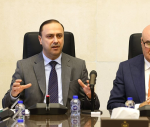You are here
Full plate for Obama
May 14,2015 - Last updated at May 14,2015
All eyes, especially in the Arab world, were focused this week on Barack Obama and the six leaders of the influential oil-rich Arabian Gulf states who were invited to the United States at the presidential compound in Camp David primarily to discuss the upcoming talks with Iran on its nuclear ambitions.
The unexpected absence of the influential King Salman of Saudi Arabia sparked an exaggerated political storm on the eve of the all-significant session, with many believing that the absence signals a rift between the Obama administration and the Saudi monarch.
The two sides rejected this misinformation, partly pointing to Saudi Arabia’s entanglement with the deteriorating political and security conditions in neighbouring Yemen, as well as the health of the king.
Three other monarchs were likewise disabled, prompting their unfortunate absence.
The relationships between Saudi Arabia and the United States is noteworthy for the sale of over $50 billion worth of weapons over the last few decades.
Recently, however, there has been a noticeable decline in US imports of oil from the Arab kingdom, since US oil resources have lately expanded.
The Saudi king is represented by Crown Prince Mohammed Bin Nayef, who reportedly has strong ties with the US political and security establishments, as well as by Deputy Crown Prince Mohammed Bin Salman, the king’s son who also serves as defence minister.
Although the Saudi government has not expressed any public misgivings about the ongoing talks between Iran and the so-called P5+1 team representing the five permanent members of the UN Security Council, namely China, France, Russia, the United Kingdom and the United States plus Germany, there is general disappointment in the Arab Gulf region about US silence about growing Iranian influence in the region, especially in Syria, Iraq and even Lebanon.
On the other hand, it is reportedly important for Obama to be able to tell his serious opposition in the US Congress that the anticipated Iranian deal has broad regional support from the GCC members, namely Saudi Arabia, Kuwait, Qatar, the United Arab Emirates, Bahrain and Oman.
The deal with Iran is expected to be finalised by June 30.
Additionally Bahrain’s hosting the US Fifth Fleet is an achievement.
Despite Obama’s focus on Iran, a commendable step, his reluctance to crack the whip on Israel’s continued expansion in the occupied Palestinian territories, including East Jerusalem, remains a black spot on his record.
Regrettably, no mention has been made, for this unprecedented session with the Gulf states, about this other crucial Mideast issue, namely Israel’s policies, which resulted in a weakened Knesset, whereby the government has a majority of only one seat.
The US this week mildly reproached Israel for building new houses for Jews in East Jerusalem, but it is high time that the Obama administration voice more serious concern, rather than just “disappointment” and “concern” over this Israeli action, or statements like the one made a week ago by US Undersecretary of State for Political Affairs Wendy Sherman, who said that if the new Israeli government does not demonstrate commitment to a two-state solution, the US will have a difficult time continuing to assist its efforts to halt international initiatives on Palestine at the United Nations, reported Haaretz.
Wisconsin Governor Scott Walker, reportedly a Republican candidate running for president, is now visiting Israel as ”a traditional primary step”, according to Haaretz.
“But if you want to know what he’s up to in Israel,” the paper continued, “you would have to follow the Republican Jewish Coalition’s executive director on Twitter.”
The trip is funded by Our American Revival and the Republican Jewish Coalition.
Obama needs to act before the end of his presidential term next year, otherwise such immature political aspirants will help ruin America’s reputation worldwide.
The writer is a Washington-based columnist.












